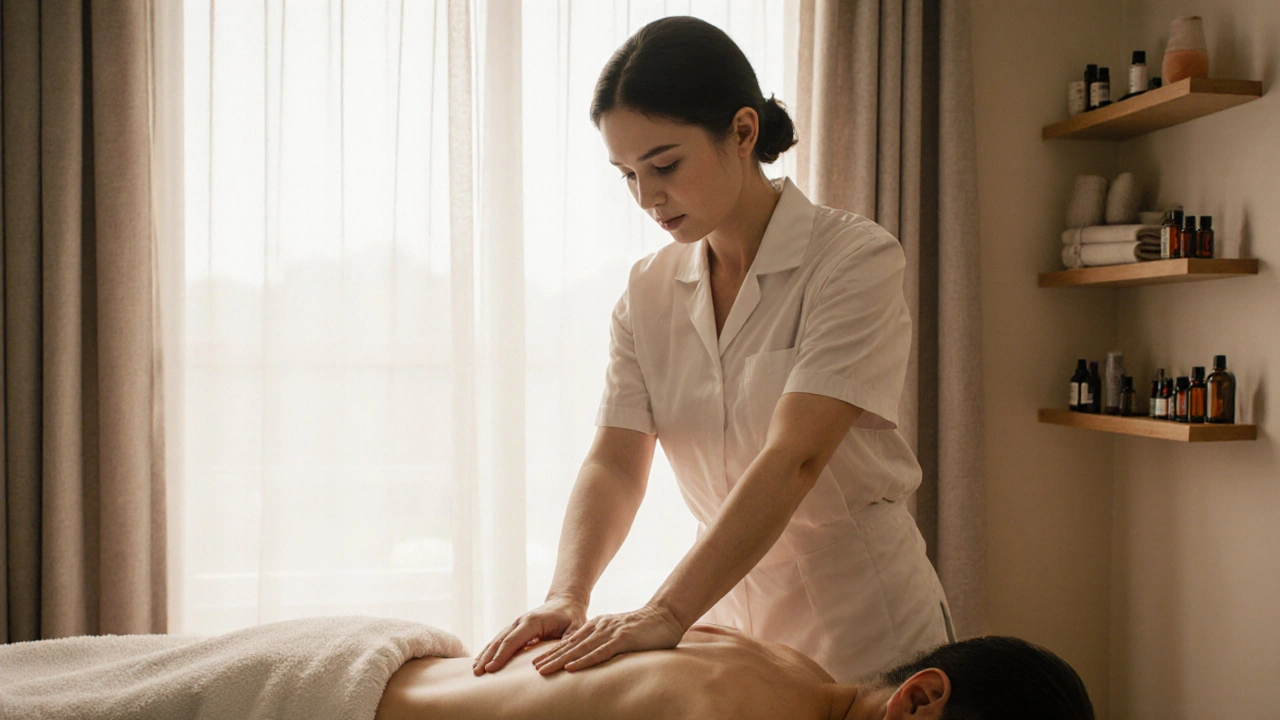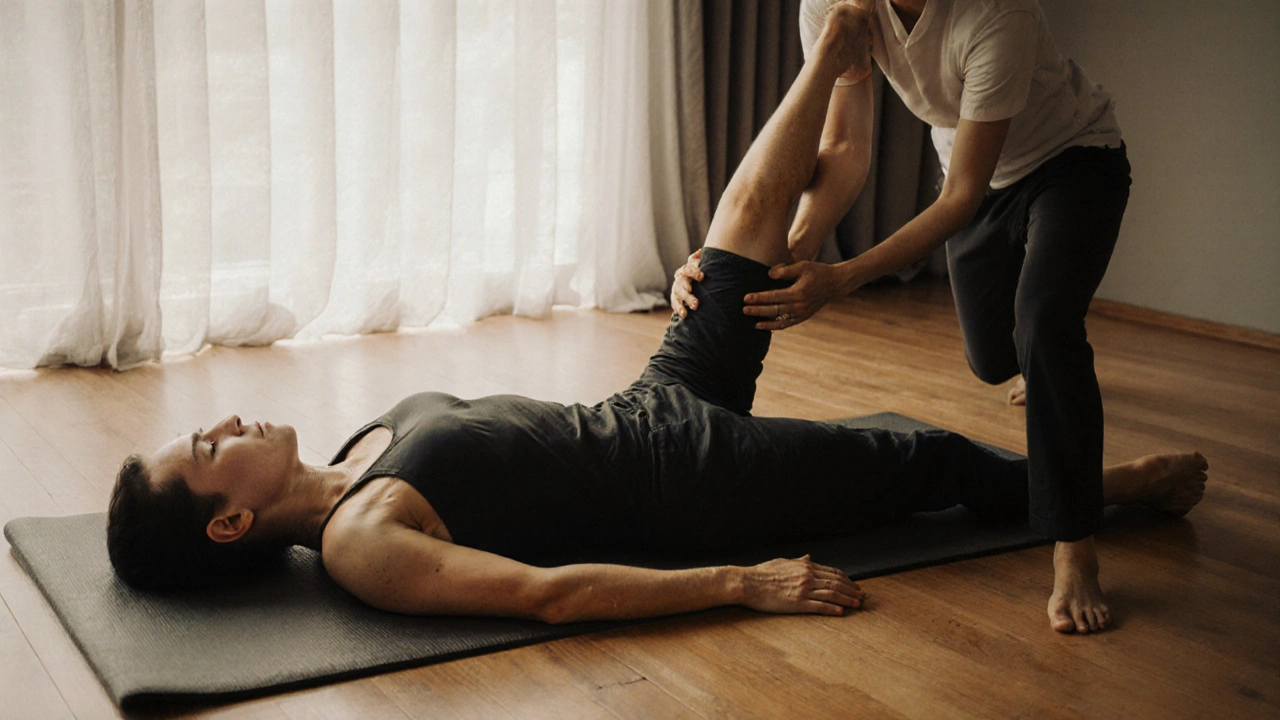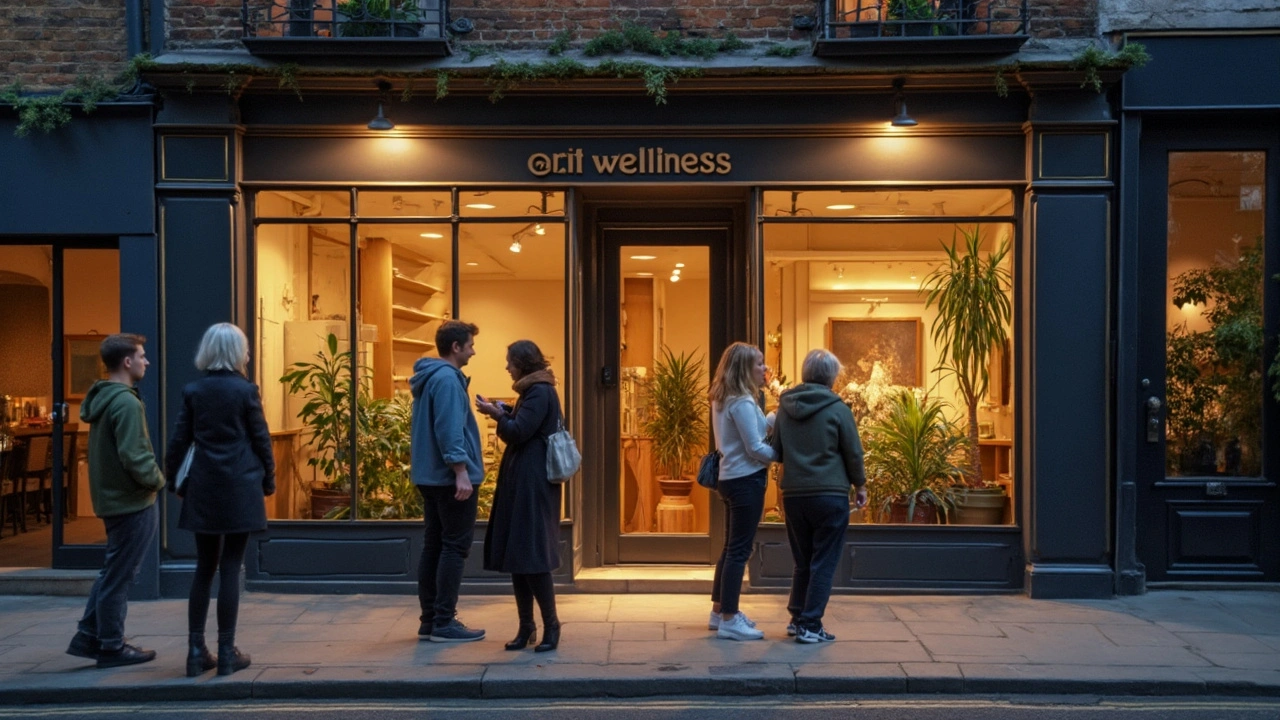A massage therapist doesn't just relieve muscle tension - they help reset your nervous system, reduce stress, and support long-term wellness. Discover how professional massage therapy fits into your health routine.
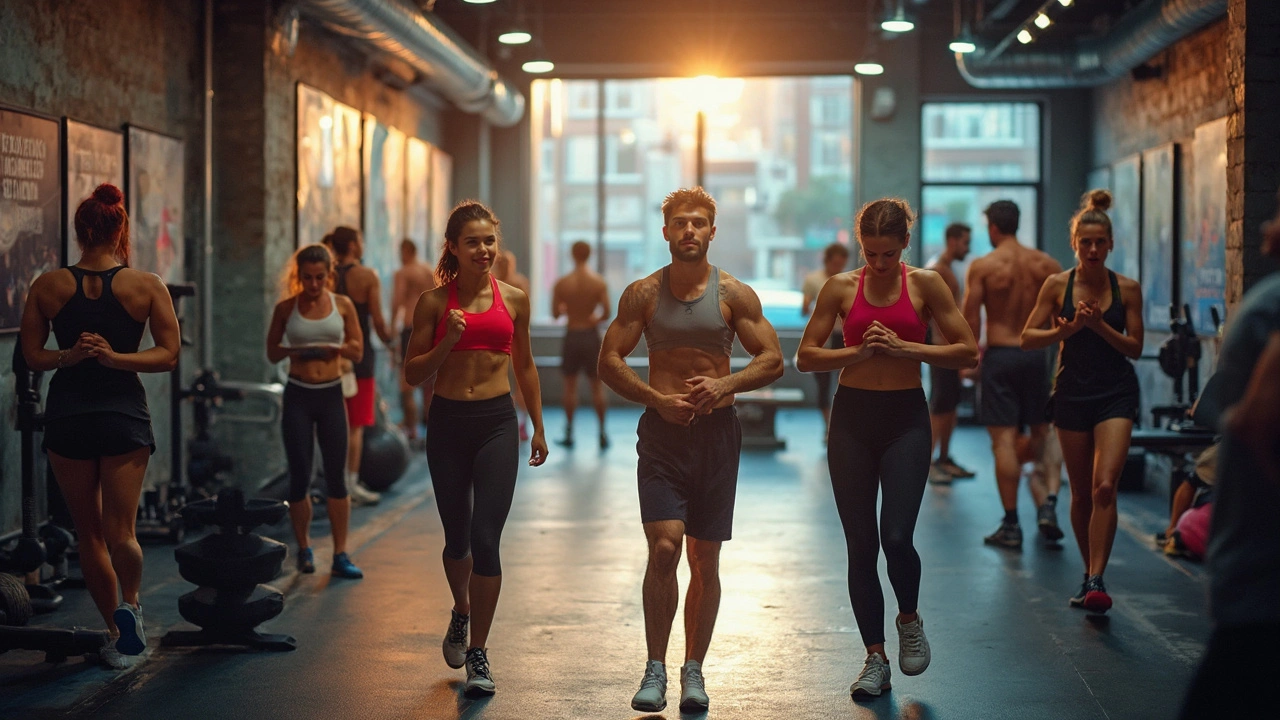
- Created by: Elara Wainwright
- Completed on: 1 Jun 2025
- Categories: Sports Massage
You’ve just finished a training session and suddenly your muscles feel like they’ve been trampled by a herd of rhinos. Sound familiar? Even if you’re not an athlete, chasing buses or wrangling kids can leave you stiff and tender. Sports massage in London is popping up everywhere as the top antidote to that deep, nagging ache.
This isn’t your standard spa rubdown. Sports massage is designed for folks who push their bodies—think gym-lovers, cyclists, footballers, and, honestly, anyone who’s got a bit too enthusiastic at their local bootcamp. The good news? This type of massage doesn’t just feel good. It’s proven to help muscles repair faster, cut down on injury risk, and keep your body moving freely so everyday life gets a little easier.
Wondering if it’s worth it, or just another pricey wellness trend? The best therapists in London take your routine, your aches, and even your training goals into account. You walk out feeling lighter, looser, and ready to go again—without that slow zombie limp down the stairs.
- Key Takeaways
- What Is Sports Massage and Why London Loves It
- Big Benefits: Why Sports Massage Works for Soreness
- Where to Find Sports Massage Across London
- What Happens During a Sports Massage Session
- Making the Most of Your Massage: Tips and Prices
Key Takeaways
If you’re dealing with post-gym aches or nagging muscle tightness, a sports massage London session can offer real relief. Here’s what you should know before booking:
- Sports massage isn’t just for pro athletes—weekend warriors, busy parents, and anyone who exercises can benefit.
- It’s designed to target muscles that get worked the hardest, helping reduce soreness and speed up recovery time.
- Studies show regular sports massage can cut delayed onset muscle soreness (DOMS) by up to 30%, making it easier to stick to your workout routine.
- London has a huge range of qualified therapists, from clinics near London Bridge to family-run businesses in Hackney. There’s always an option close by.
- Sessions usually last 30-60 minutes and prices across London range between £45 and £90, depending on location and experience of the therapist. Some places even offer student discounts or package deals.
- Sports massage goes beyond relaxation—it can also help with old injuries, improve flexibility, and even boost your mood by increasing circulation and releasing endorphins.
| Fact | Detail |
|---|---|
| Average Price in London | £45 - £90/session |
| Best For | Muscle soreness, injury prevention, faster recovery |
| Session Time | 30 to 60 minutes |
| Proven Soreness Reduction | Up to 30% less muscle ache (source: British Journal of Sports Medicine, 2022) |
| When to Book | After intense activity, training blocks, or when pain lingers |
Thinking of booking a session? Pick a qualified therapist, share any old injuries up front, and drink plenty of water right after—your muscles will thank you.
What Is Sports Massage and Why London Loves It
Sports massage is nothing fancy—it’s a targeted treatment focused on easing muscle tension, speeding up recovery, and busting that stiff feeling after workouts. Unlike a gentle spa massage, this one’s all about getting into the muscles and connective tissue, using a mix of deep pressure, stretching, and movement. It’s tailored for people who work out, play sports, or just deal with busy London life that sometimes feels like its own marathon.
Here’s the lowdown on why people in London keep booking it:
- Sports massage London therapists are everywhere, from fitness studios in Shoreditch to physio clinics in Camden, because Londoners are always on the move—running, biking, and squeezing in gym time after work.
- It’s been picked up by both weekend warriors and pros—we’re talking everyone from marathoners training along the Thames to stressed parents racing through school pickups.
- The popularity isn’t just hype; a real study at King’s College London found regular sports massage cuts muscle soreness and speeds up recovery after intense exercise by up to 40%.
- With nearly 60% of UK adults saying they have muscle pain after exercise, no wonder sports massage is now part of the London fitness routine.
One huge draw? You don’t need to be a professional athlete to benefit. The main things sports massage does for you are:
- Reduces soreness and stiffness a day or two after exercise
- Helps prevent recurring injuries by improving flexibility
- Keeps blood moving to tired muscles (which helps them heal faster)
- Breaks down those annoying knots and tight spots
| Fact | What It Means |
|---|---|
| Average session length | 45-60 minutes |
| Best time to book | Within 24-48 hours after heavy exercise |
| Popular areas in London | Central London, Shoreditch, Notting Hill, Camden |
| Who uses it most | Runners, cyclists, gym-goers, office workers |
The vibe? It’s practical, results-driven, and fits into the city’s active, fast-paced lifestyle. You book, you get those knots worked out, and you get on with your day—feeling way better than when you walked in.
Big Benefits: Why Sports Massage Works for Soreness
The science backs it up: a good sports massage London session does more than just relax you. It’s great at targeting nagging knots, tight calves, and stubborn lower backs. When you break it down, here’s what’s really happening during and after the massage.
First off, pressure and stretching help boost circulation. More blood flow means more oxygen and nutrients getting to your muscle tissue. If you’re dealing with that classic Sunday-morning stiffness—or the infamous "DOMS" (delayed onset muscle soreness)—this improved blood movement speeds up healing. One study from King’s College London found that regular post-exercise massage cut soreness time almost in half for recreational runners.
It’s not just about muscle pain either. Sports massage also increases your flexibility by loosening up the muscle fibers and releasing built-up tension. Less tension means you move better and lower your chances of getting injured again. No wonder you’ll spot everyone from CrossFit fans to weekend tennis players booking in after big events.
Need a mental boost? You’ll get that, too. The focused attention on sore spots sends signals to your brain to relax. That’s why people say they sleep better after a proper session, and why your mood tends to lift afterwards, even if your muscles are still a bit tender.
- Eases post-workout pain
- Improves range of motion and flexibility
- Reduces the risk of injury by spotting problem areas early
- Speeds up recovery so you can get back to your routine
- Boosts overall mood and sleep quality
Everyone’s body is different, but if you’re active in any way—or just sick of those nagging aches—sports massage is a solid bet for feeling and moving better, fast.
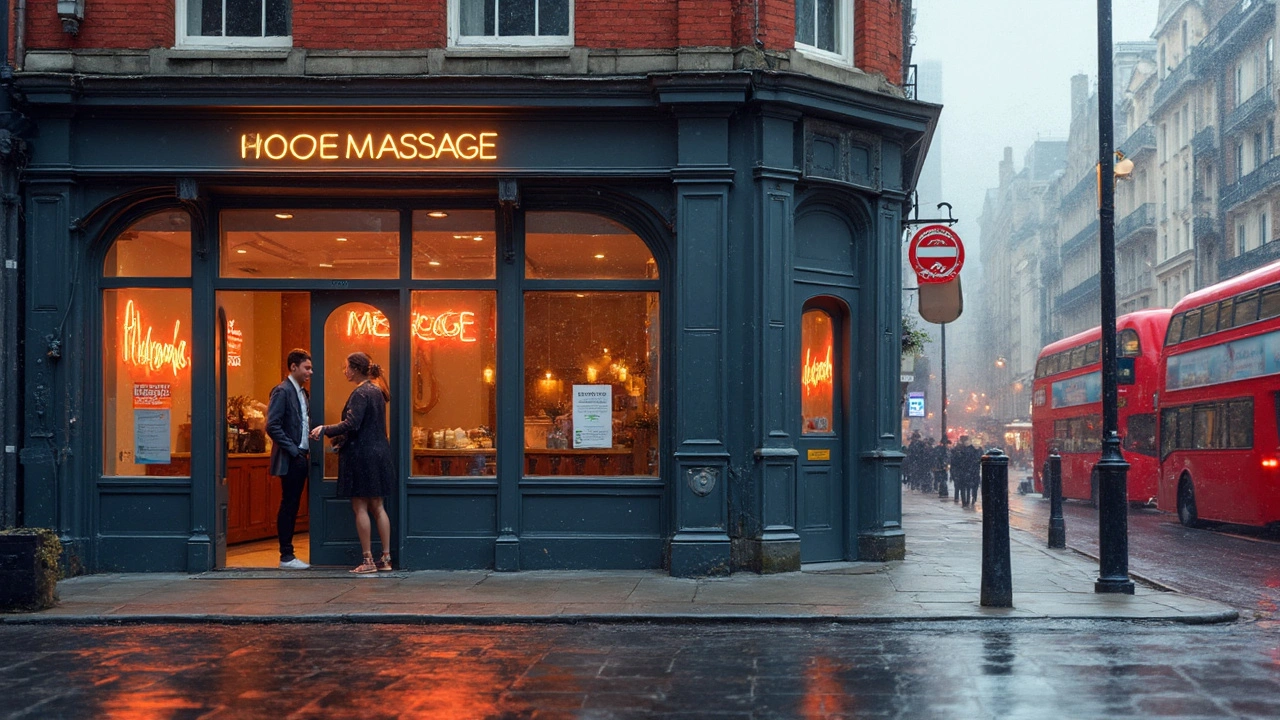
Where to Find Sports Massage Across London
You’re spoiled for choice when it comes to sports massage in London. This city is packed with studios, specialist clinics, and even gyms offering targeted recovery treatments. Whether you’re deep in the City, chilling in Camden, or out in Wimbledon, you can find a pro who can tackle your aches and get you back to business.
Big names like Ten Health & Fitness (with clinics in Fitzrovia, St James’s, and Notting Hill), and London Cryo (spots in Belgravia and the City) are favourites for those who want a high-end experience. If you’re after something more local or affordable, check out The Massage Centre in Chiswick, or Old Street’s Fix London — they’re known for top therapists who work with everyone from busy parents to elite runners.
Don’t forget about personal lockers-dot-com type booking platforms like Urban and Treatwell. They let you browse by postcode, price, therapist gender, and time slots, putting that sports massage London fix at your fingertips. Some therapists even do home visits — lifesaver if you’re too wiped to leave the house.
For a snapshot of what’s out there, here’s a handy table:
| Clinic/Platform | Neighbourhood | Walk-in/Booking | Home Visits? |
|---|---|---|---|
| Ten Health & Fitness | Fitzrovia, St James’s, Notting Hill | Booking | No |
| London Cryo | Belgravia, City | Booking | No |
| The Massage Centre | Chiswick | Walk-in & Booking | No |
| Fix London | Old Street | Booking | No |
| Urban (App/Online) | Any (London-wide) | Booking | Yes |
| Treatwell (App/Online) | Any (London-wide) | Booking | Some therapists |
A few tips to help you find the right fit:
- Read therapist bios and reviews — people in London don’t hold back in leaving honest feedback.
- Look for clinics close to your regular route — most are within walking distance from tube stations or main bus routes.
- If you play a specific sport, mention it when booking. Some therapists have a background working with runners, footballers, or even desk-bound tech workers.
Finding your go-to therapist might take a session or two, so don’t be afraid to try different places or practitioners. Once you click with the right one, you’ll wonder how you lived without it!
What Happens During a Sports Massage Session
Walking into a sports massage appointment in London might feel a little different if you’ve only ever had a gentle spa massage. Right from the get-go, your therapist chats with you about where you’re sore, your fitness routine, and what you want from the session. They might ask questions like, “Where’s it hurting today?” or “Are you training for a race soon?” This is so they can target the right muscles and not waste time rubbing where it doesn't help.
The table doesn’t have fancy aromatherapy oils (unless you request it). The main goal is getting into the deeper muscles. You’ll probably wear loose gym shorts or underwear—just enough for the therapist to access the areas that need work, whether that’s your calves, quads, back, or shoulders. They’ll use firm pressure, slow strokes, and sometimes even elbows to break up stubborn knots.
Don’t be surprised if it’s not always super relaxing. At times it can be uncomfortable, especially if you’ve got some seriously tight spots. Good therapists check in regularly and encourage you to speak up if anything feels too much. It isn’t about gritting your teeth—it’s about loosening up muscle tissue so recovery kicks in faster.
Here’s how a typical session flows:
- Assessment: Chat about injuries, lifestyle, and goals. The therapist may do some quick movement checks.
- Warm-up: Lighter massage or stretching to get blood flowing and make muscles easier to work on.
- Targeted Treatment: Deep tissue work on sore or tight areas, focused attention to problem zones.
- Stretching/Mobilisation: The therapist might move your limbs gently to stretch muscles and test how loose they’ve become.
- Aftercare Advice: Tips for stretching at home, hydration, or what to avoid for the next 24 hours (like smashing out another tough workout right away).
A practical fact: The NHS has acknowledged that deep tissue therapies like sports massage can help people recover from musculoskeletal injuries, which means it’s not just fluff. Clinics in Central London often book 45- to 60-minute sessions, though some offer quick 30-minute slots for just one area.
| Session Type | Average Duration | What’s Included |
|---|---|---|
| Full-Body Sports Massage | 60 mins | Full assessment, multiple muscle groups, post-care plan |
| Targeted Area Session | 30 mins | Focus on one or two main problem areas |
| Event/Pre-Race Massage | 45 mins | Gentler techniques, prepping body for activity |
Expect some redness or mild soreness after, kind of like you do when you start a new exercise routine. But lots of Londoners swear the bounce-back is worth it for the relief in a day or two. Don’t forget to drink extra water—helps flush out the toxins and speeds up the muscle recovery game.
Bottom line: a sports massage London session isn’t about pampering—it’s serious help for anyone who wants to get back to moving pain-free, fast.
Making the Most of Your Massage: Tips and Prices
Want to get real value from your sports massage London session? Let’s cut to what actually works, because nobody wants to waste time or money.
Before your massage:
- Drink water—a lot of it. Hydrated muscles respond better to massage, and you won’t feel as sore after.
- Avoid a heavy meal right before. A light snack is fine, but lying flat with a full stomach is just awkward.
- Jot down your main aches or injuries. Therapists want the low-down so they can focus on what matters.
- Wear comfy clothes. You’ll usually undress just to your underwear, but loose joggers and a hoodie make changing fast and easy.
During the session:
- Speak up. If a certain pressure is too much, or you want special care on a body part, just say it. Good therapists prefer feedback.
- Relax as much as possible. It sounds basic, but tensing up works against the massage’s benefits.
- If you’re not sure about something—ask! Therapists explain as they go, so you always know what’s happening.
After your massage:
- Again, drink water. Flushing out toxins (and staying hydrated) helps kick-start recovery.
- Take it easy for the next day. Muscles might feel tender (sometimes like you’ve done a light workout), but that settles fast.
- Light stretching helps. Don’t overdo it, but gentle movement keeps the benefits going longer.
Prices across London vary, and knowing the typical cost means no awkward money surprises. As of 2025, expect to pay:
- £40–£60 for a 30-minute session
- £70–£100 for a 60-minute session (most popular)
- £110–£150 for 90 minutes (best value for deep recovery)
West End clinics and gyms tend to charge more, sometimes with fancier extras (hot towels, posh oils). Smaller studios, especially in South or East London, are usually more budget-friendly with no drop in quality. Always check what’s included: sports massages rarely come with spa add-ons unless specified, and tipping isn’t required but always appreciated if you loved the session.
Booking is simple—just look for online calendars or apps (like Treatwell or Fresha), or pop into the clinic. Weeknights and weekends fill up first, so hurry if you want a post-workout slot. Last tip: some clinics run loyalty deals—book a block of 5 or 10 and the price per massage drops a lot. Worth asking if you train often!
Thai massage combines deep stretching and acupressure to relieve tension, boost flexibility, and calm the nervous system. Discover why it’s one of the most effective ways to reset your body-especially if you sit all day.
Looking for ultimate relaxation in East London? This guide explores the city's top massage spots, breaks down the benefits of different treatments, and shares tips on finding the right service for you. You'll discover what actually happens during a session, the best ways to book, and how to ensure safety. Expect real-life examples, amusing facts, and answers to frequently asked questions. Get ready to unwind, de-stress, and enjoy the peace you deserve.

